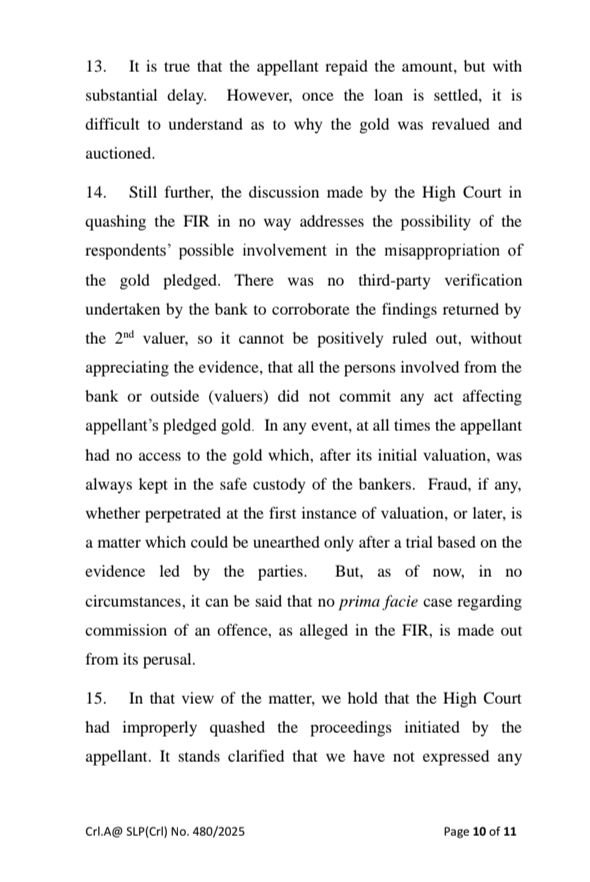Quashing a Fraud FIR Without Evidence? SC Restores Banker’s Trial in Gold Loan Dispute
- M.R Mishra

- Jun 8, 2025
- 3 min read
In Abhishek Singh v. Ajay Kumar & Ors., the Supreme Court delivered a sharp rebuke to judicial overreach in quashing FIRs based solely on disputed facts.
The Court restored criminal proceedings against a bank manager and others accused of fraudulently denying the return of pledged gold despite the borrower’s full repayment of a loan. It reaffirmed that where serious allegations of misappropriation and tampering are made, the matter cannot be nipped prematurely through Section 482 CrPC when the evidence is yet to unfold at trial.
A businessman repaid his gold loan in full but was later told by the bank that his pledged gold was fake. He filed an FIR against bank officials for fraud. The High Court quashed it, calling it malicious. The Supreme Court restored the case, saying serious allegations like this need a proper trial.

What's The Matter?
The case revolved around a gold loan of ₹7.7 lakhs taken in July 2020 by Abhishek Singh, a businessman who had pledged 254 grams of 22-carat gold. The dispute arose after Singh repaid the entire amount, including interest, by March 2023. Yet, when he sought the return of his pledged gold, the bank refused, claiming that a revaluation conducted after loan closure revealed that the ornaments were fake gold-plated, not solid gold.
The appellant alleged foul play.
He claimed the gold was revalued behind his back and possibly tampered with while in the exclusive custody of the bank.
A complaint filed under Section 156(3) CrPC resulted in an FIR against the branch manager and others for cheating and criminal breach of trust under Sections 420, 406, and 34 IPC.
However, the Patna High Court quashed the FIR at the instance of the bank officials, calling it a “counterblast” to a previous FIR filed by the bank against the borrower. The High Court accused Singh of acting with “ulterior motive,” found no prima facie offence, and cited the absence of an affidavit under Priyanka Srivastava v. State of UP to rule the complaint unsustainable.
What Happened in Court?
The Supreme Court, however, found the High Court’s approach fundamentally flawed. Justice Sanjay Karol, writing for the bench, observed that the High Court went beyond the permissible scope of Section 482 by making merit-based findings concluding that the borrower’s intent was malicious and that no wrongdoing occurred by the bank.
These were conclusions that required evidence and trial, not summary dismissal.

The Court highlighted that:
The gold had been in the bank's custody from the date of loan sanction to the alleged revaluation;
The second valuer’s report branding the ornaments as fake came only after full repayment;
No third-party verification was done;
The bank failed to initiate standard recovery through auction as per protocol;
And the FIR clearly disclosed a prima facie case of misappropriation and breach of trust.
Most significantly, the Court underscored that allegations of fraud and criminal breach particularly when involving custody of valuable items require full trial scrutiny. Courts cannot quash such FIRs unless they are inherently absurd or malicious on the face of the complaint.

The Supreme Court noted that even if the earlier valuer had erred, or the ornaments were suspect, those questions needed to be adjudicated on evidence.
In reversing the quashing order, the Court restored the FIR and directed that the case proceed to trial without delay. It reiterated that criminal process cannot be halted at inception where plausible allegations exist—especially in financial disputes involving trust and fiduciary breach.
This Case is a reminder that judicial economy must never come at the cost of substantive justice. It warns against the casual use of Section 482 CrPC to short-circuit accountability, particularly in banking and financial frauds where the chain of custody and institutional safeguards are called into question.
At its core, the judgment defends a basic proposition: if gold vanishes or changes form under someone’s official custody, the law must take its full course before declaring anyone innocent.







Comments